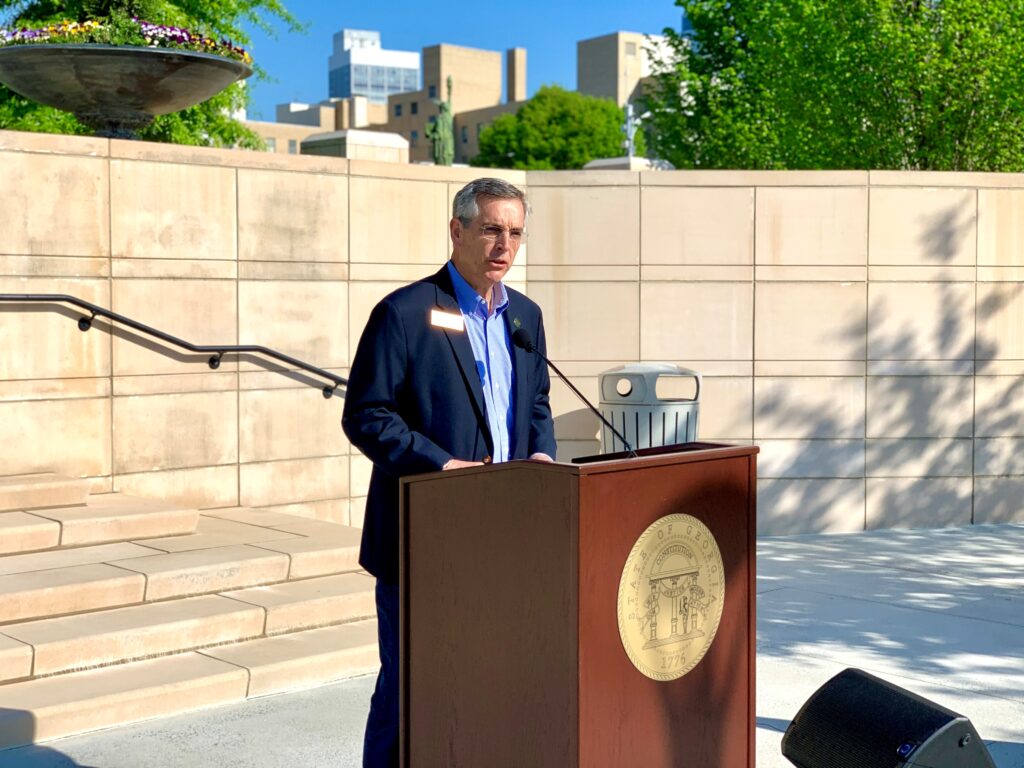
ATLANTA – Georgia’s primary election set for May 19 will be postponed three weeks to June 9 due to health and safety concerns over coronavirus, Secretary of State Brad Raffensperger announced Thursday.
The move came after Gov. Brian Kemp extended the state’s public health emergency status another month to May 13, a step Raffensperger said was legally necessary before the primary could be delayed.
“This decision allows our office and county election officials to continue to put in place contingency plans to ensure that voting can be safe and secure when in-person voting begins and prioritizes the health and safety of voters, county election officials and poll workers,” Raffensperger said in a statement Thursday.
Early voting for the primary now starts May 18. Voter registration will end May 11.
Raffensperger’s office is sending absentee ballot applications to every Georgia voter. Requests for mail-in ballots that have already been sent in will still be valid to receive an absentee ballot for the June 9 election, Raffensperger’s office said in a news release.
The June 9 primary is poised to be the first statewide test of Georgia’s new voting machines, which involve touchscreens and scanners that officials have hailed as a secure, paper-based voting process.
Without a delay, the primary election featuring presidential, state and local primary contests scheduled for May 19 faced a scenario in which many poll workers may not have shown up to staff voting precincts.
Poll workers on average tend to be older adults who are more at risk of harmful impacts from COVID-19, the disease caused by the novel strain of coronavirus that has sickened thousands of Georgians and killed hundreds.
On Thursday, Raffensperger said his office has fielded “reports of mounting difficulties” that county elections officials were struggling to have precincts ready in-person early voting set to begin April 27, ahead of a May 19 election.
The three-week delay gives state and county election officials more time to train poll workers, distribute cleaning supplies and draw backup plans for any possible issues.
“Just like our brave health-care workers and first responders, our county election officials and poll workers are undertaking work critical to our democracy, and they will continue to do this critical work with all the challenges that the current crisis has brought forth,” Raffensperger said.
It’s the second time the state’s presidential primary will be delayed after originally being set for March 24.
Raffensperger’s office indicated delaying it and the local primaries again would be tough, since holding the primaries past June 9 could conflict with federal law requiring certain deadlines for runoff results and ballot creation to be met for the Nov. 3 general election.
“I certainly realize that every difficulty will not be completely solved by the time in-person voting begins for the June 9 election, but elections must happen even in less than ideal circumstances,” Raffensperger said.
Raffensperger, a Republican, faced increasing pressure in recent weeks from influential Republican lawmakers including House Speaker David Ralston and all 11 of Georgia’s Republican congressional members to push back the primary to mid-June.
Until Thursday, Raffensperger said he would need the governor to extend the public health emergency beyond its original April 13 expiration date before he could delay the primary, though legislative counsel for the General Assembly disputed that legal interpretation.
Kemp signed an executive order Wednesday extending the emergency status through May 13, which Raffensperger said cleared the way for him to act.
Georgia Democratic leaders, meanwhile, had previously opposed a delay past May 19, arguing state officials should instead focus on bolstering absentee voting.
Raffensperger’s decision also followed an intense national backlash in Wisconsin, where a primary election was held Tuesday despite efforts from Wisconsin’s governor to delay it. News reports showed long lines of voters wearing face masks in the middle of the worst period of the coronavirus outbreak, sparking anguish over the potential health dangers and accusations of voter suppression.